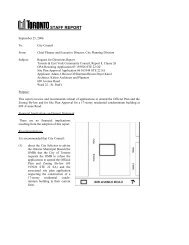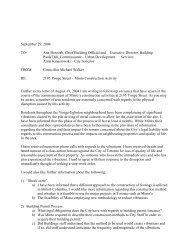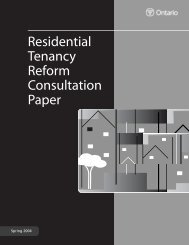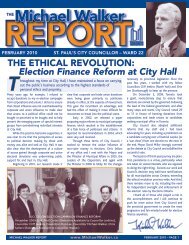Residential Tenancies Act: Briefing Book - Michael Walker
Residential Tenancies Act: Briefing Book - Michael Walker
Residential Tenancies Act: Briefing Book - Michael Walker
Create successful ePaper yourself
Turn your PDF publications into a flip-book with our unique Google optimized e-Paper software.
EVICTIONS<br />
<strong>Residential</strong> <strong>Tenancies</strong> <strong>Act</strong>, 2007<br />
B R I E F I N G B O O K<br />
Overview of the <strong>Residential</strong> <strong>Tenancies</strong> <strong>Act</strong><br />
Background<br />
Tenants have security of tenure. This means that they can continue to rent their homes for<br />
as long as they choose, except for very specific reasons. A tenant with a one year lease<br />
who pays the rent each month, for example, can remain in their unit after the lease has<br />
ended on a month to month basis, even if they do not sign another lease. Tenants must<br />
give proper advance notice to move out, generally 60 days from the end of the term or the<br />
last day of the lease.<br />
Most disputes between landlords and tenants concern termination of tenancies before the<br />
end of the lease or term, also known as evictions. A landlord may evict a tenant only for<br />
reasons permitted by the RTA. Sometimes the eviction may result from the conduct or<br />
actions of a tenant or their guests. This is called termination for cause. In other cases,<br />
tenants may be evicted because of other circumstances relating to ownership or<br />
disposition of the property. This is called a no fault termination.<br />
Causes of Eviction<br />
There are different causes that may lead a tenant to being evicted, including:<br />
� failure to pay rent;<br />
� consistent late payment of rent;<br />
� the tenant or another occupant has caused or permitted illegal activities in the<br />
rental unit or property;<br />
� the tenant, another occupant, or their guest has caused damage to the rental unit or<br />
property;<br />
� the tenant, another occupant or their guest has done something that impaired the<br />
safety of others;<br />
� the tenant, another occupant or their guest has disturbed the reasonable enjoyment<br />
of other tenants or the landlord;<br />
� allowing too many people to live in the rental unit that is inconsistent with health,<br />
safety or housing standards; and<br />
� misrepresentation of income when living in subsidized housing.<br />
No fault reasons include:<br />
� The landlord wants the unit for their own residence or for their spouse or<br />
� partner, or a child or parent of one of them, or a caregiver for the landlord or a<br />
family member;<br />
� The landlord of a property with no more than three units has agreed to sell the<br />
property to someone who wants all or part of the property for their own residence,<br />
15






